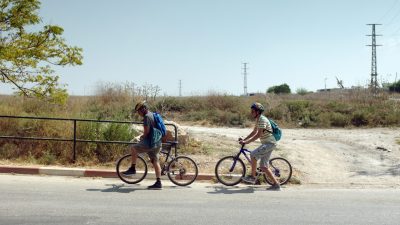The third-annual Boston Israeli Film Festival, hosted by Boston Jewish Film, began Thursday and will run until Wednesday. The festival, which usually takes place in Boston-area theaters such as the Coolidge Corner and Brattle Theaters, will look different than usual this year and take place entirely online.

The program includes a selection of Israeli movies released in 2020, like the feature film “Sky Raiders” and documentaries “Four Mothers,” “Rain in Her Eyes” and “Rockfour: The Time Machine.” Live conversations with directors, actors and subjects will accompany each film.
Viewings of “Rockfour: The Time Machine” will be accompanied by a live musical performance via Zoom by the Israeli ‘80s band featured in the film, “Rockfour.”
Participants who bought online tickets or a Festival Pass may watch the films anytime within the festival period but must finish watching a film within 48 hours after starting.
Heidi Heinlein, grants manager for the Cummings Foundation — one of the festival’s financial backers — wrote in an email statement the foundation was “delighted” to contribute.
“We’re most grateful for this organization’s work to celebrate the richness of the Jewish experience through film and media,” she wrote.
The festival kicks off Thursday night with a virtual cake-making class led by chef Liora Kushner, which will feature a live demonstration of how to make an Israeli no-bake biscuit cake. Kushner is the owner of Liora’s Catering, a Boston-area catering company specializing in Mediterranean cuisine.
Kushner said she hopes the event will be a fun way to start off the festival.
“The Jewish film crowd can be a little older, so I don’t know if that’s something that they will really endorse,” Kushner said. “I hope at least some of them may try it at home.”
Lisa Fishbayn Joffe, a lecturer in Near Eastern and Judaic studies at Brandeis University, is the moderator for the live conversation Monday around the film “Four Mothers” — a documentary about a grassroots movement of the same name that helped lobby the Israeli government to stop the war with Lebanon in 2000.
“It’s an interesting exploration of feminist politics in Israel, an example of women who came together to organize around their identity as mothers,” Fishbayn Joffe said, “and really challenged conventional notions at the time about women’s influence over questions regarding security and national and international policy.”
Rachel Ben Dor, the founder and chairperson of the Four Mothers movement, will be featured in the “Four Mothers” live conversation.
Ben Dor, who is currently working on a book recounting the story of the movement, said she hopes it will be remembered by the Israeli community and wants to translate her work into English.
“It’s important for Israeli audiences to remember this event,” Ben Dor said. “They still do, it’s unbelievable, but to remind them that, especially today, protests can work, and people should get involved … You cannot just let the army or some politician decide if you are going to sacrifice your life in a war or not, you have to be part of this discussion.”
Joffe said there are benefits to hosting the festival online that would not be possible in its typical in-person format.
“There are, I think, quite positive things that have come out of being able to connect in an online space,” Joffe said. “I think it makes it easier for people who have disabilities, or they find it difficult to travel or have financial challenges to participate in programs.”
Ariana Cohen-Halberstam, artistic director at Boston Jewish Film, said she hopes festival participants will learn more about Israel and its filmmaking culture.
“Israel came out as one of the leaders in creating really good film content, and we’re seeing this now in TV too,” Cohen-Halberstam said. “I think with the way the Israeli film industry is going, there’s going to be a lot more material for us every year to choose from.”
Cohen-Halberstam said she hopes everyone will find something to enjoy during the festival.
“One of the most important things that movies can do is teach people about other cultures and other people’s lives,” she said. “We’re showing historical documentaries and music documentaries and we’re also showing a romantic comedy about a couple meeting in their late 60s, so I think there’s a story for everyone.”


















































































































